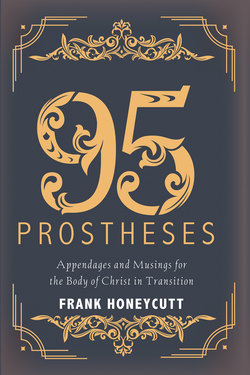Читать книгу 95 Prostheses - Frank G. Honeycutt - Страница 9
На сайте Литреса книга снята с продажи.
3. The Odd Gift of Endings
Оглавление“So teach us to number our days, that we may apply our hearts to wisdom” (Ps 90:12, KJV).
Not long ago, after visiting a parishioner recovering from surgery in Mountain Rest, I hopped over to Highway 107, swung into the state park, changed out of my dress shoes, and started walking down the Foothills Trail. Hardly anyone was around. It was about 3:00 pm and warm with beautiful light angling amazingly through remaining leaves; one of those perfectly blue afternoons that make you think about the sweep of your life and time passing. I hiked for about twenty minutes, maybe a mile, and found a place to sit and think and pray.
I recently helped my parents move from Chattanooga to Clemson after we all agreed they could no longer safely live alone. My mom’s been ready to move for awhile, but Dad (after sixty years in the city) wasn’t so sure. It’s hard to leave friends and church and a doctor who knows all about your strengths and flaws. Hard to leave your neighborhood barber who hugged my father (his first customer in 1957) and said through tears after the last haircut, “This one’s on me.” Hard to admit physical and mental limitations that will come to us all.
We wandered from room to room in silence after the house was completely empty, the small home in East Brainerd where I grew up and (with my friend Jimmy) smacked golf balls over I-75 with a three-wood teed up in the front yard. Four of us stood in a tight circle in the bare den and the son who is also a pastor prayed a parting prayer that included this petition: “And Lord, thanks also for protecting my little brother Lee on those late nights when he removed the screen and snuck out the back window to cavort with friends leading him who knows where.”
There’s a great scene in the movie Smoke (1995), starring Harvey Keitel and William Hurt. Keitel plays a guy named Augie who runs a tobacco shop in busy downtown Manhattan. Augie has this unusual habit of taking a single photo each morning at the same time out in front of his shop—each day, same exact time, 365 photos each year. He never misses. Different people inhabit these photos, but the buildings and the camera angle are essentially the same. Augie has dozens of photo albums filled with pictures of his little street corner, spanning several decades of time.
It’s a very private hobby. Not many people know about it, but one night Augie decides to show the albums to his friend (played by William Hurt), who is amazed but flips through the pages hastily and says, “But they’re all the same.”
Augie starts to collect his photo albums, a bit offended. “You’re missing it. You’ll miss the point if you look at them that way. You’ll miss the people. All these people who have come to my little corner in this little part of the world all these years. And you’ll miss the light. How the earth turns at different times of the year. How the sun hits my corner at a different angle in the spring from the fall. You may as well not look at them if you’re gonna go that fast.”
Endings help us notice details of wonder like those noticed by Augie. It would be a rather strange existence if things just went on and on. I went online recently with a question and discovered that 152,000 people die each day around the world. That’s almost 3,200 during the time it will take you to reflect upon this essay, about the population of my little town. A lot of people, yes, but consider the alternative in a world without endings. Endings, oddly, are often an unusual gift. Endings help us to number our days; to reflect upon what people mean to us; to take note of what’s wonderfully around us—in grace and at no charge.
As I walked back to the car on the Foothills Trail, I took in the last light of the day and recalled words from my father, almost ninety, as we were leaving the house in Tennessee after that final prayer. “Promise me,” he said. “Promise me that when I die you’ll take my ashes back to Chattanooga to the church. Would you please do that?” My mom tried to hush him, but his words felt like those of some Old Testament patriarch talking to his sons towards the end of a life. We promised.
Perhaps we should regularly give thanks even for all the difficult endings in this life; endings that help us pay close attention to what’s here, unbidden and unearned, offered up in a daily and repeating menu of wonder, calling forth praise.
For further reflection:
1. Describe an “ending” (perhaps painful) in your own life, without which you’d be a very different person.
2. With Augie, what place in your neighborhood would you like to photograph each day at the exact same time?
